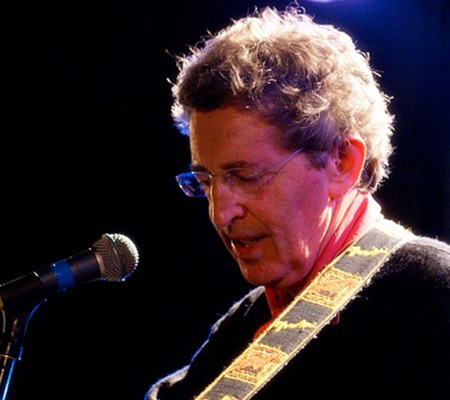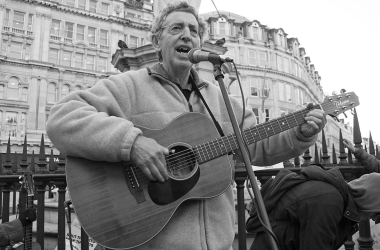By Leon Rosselson
Originally posted on Medium
November 2nd, 2017
In Between is an Israeli film written and directed by a Palestinian Israeli, Maysaloun Hamoud.
She describes it as ‘an authentic picture of a kind of invisible life
that we live here (i.e. in Israel) as a younger generation of
Palestinians’.
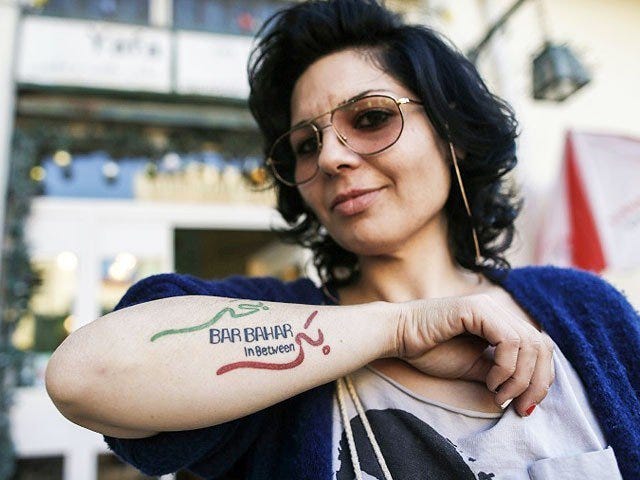
Three young Palestinian women sharing a flat in Tel Aviv are at the centre of the film. They are somewhat schematically chosen to illustrate different aspects of the problems women face in traditional patriarchal Palestinian society: Laila, secular, a lawyer who was once a Communist (the director herself comes from a Communist Party family); Salma, from a traditional Christian family, an aspiring DJ and a lesbian; and Nour, a student, from a strict Islamic background. All in their different ways assert their right to live independent lives; they reject the identities imposed on them by a repressive religion, by the traditional values of their families and by the male gaze.
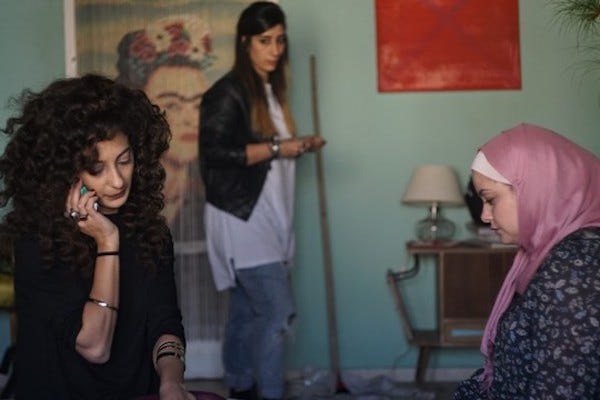
The film shows young Palestinians going to raves, partying until the early hours, smoking, drinking alcohol, taking drugs, dancing to loud music, much like young people everywhere, I suppose. Predictably, this has not gone down well with certain sections of Palestinian society. The director and the three main actors have received death threats and on-line abuse. The Mayor of Umm-al-Fahm, Nour’s home town, run by the Northern Islamic Movement, has pronounced the film haram and demanded that it be banned. A spokesman for the town explained: “It distorts our young men and women. It disturbs their reputation. It depicts them in an immoral and indecent way.” If he had actually seen the film, I doubt that his comments would have been so mild. Even the Palestinian writer, Sayed Kashua, now living in America, criticised the film for reinforcing negative stereotypes.
Hamoud has also been attacked for taking funding from the Israel Film Fund. “That money is ours,’ she responded. “We should take more. We don’t take what we deserve.” And anyway, where else was she going to get funding for her film?
The
film has won awards at the Toronto, San Sebastian, Haifa and Cannes
film festivals. It has garnered glowing reviews from western critics,
most of whom focus on the oppression of the three women by religion and
conservative Palestinian society. Well, there’s nothing new about
religion and traditional values oppressing women. What the critics seem
to overlook is the politics of the film. One reviewer wrote that the
young Palestinians were in between tradition and modernity. I don’t
think so. Another welcomed it as a ‘feel-good movie’. Hardly. Others
compared it to Sex and the City and Lena Dunham’s Girls while one described it as a light-hearted dramedy of girl power.
That
doesn’t sound like the film I saw. But I suppose that what you see in a
film is determined to some extent by the awareness and the
preconceptions you bring to it. If you go and see this film, first try
to imagine what life is like for Palestinians living in a state that
calls itself Jewish, in a city that calls itself Tel Aviv — hill of
spring in Hebrew. You are a citizen of Israel but your nationality is
Arab — there is no Israeli nationality. You are 20% of the population
living as a discriminated minority in a highly segregated society. But
that’s the least of it. As a non-Jew, you are excluded from the state’s
narrative, its myth-making, its symbolism, its national anthem, its
history and, worst of all, its future. You don’t belong. You are
unwanted.You know that the Right of Return gives all
Jews in the world — that is, all those with a Jewish grandparent — the
right to live as full citizens in Israel, while those of your family
who became refugees in the wars of 1948 and 1967 cannot return to their
homes.
You are seen as the ‘other’, the enemy, alien, a demographic threat. If you fall in love with a Palestinian from the West Bank, you cannot bring him or her to live with you in Israel. Your identity is disregarded, your culture denigrated, except where it can be appropriated and palmed off as Israeli, like hummus, falafel and — sometimes — Arabic music. You cannot even support your local football team, Maccabi Tel Aviv, because its fans, though not as overtly racist as Beitar Jerusalem’s fans whose favourite chant is Death to Arabs, regularly abuse Arab footballers in the same way that in England, in the bad old days, black players were targeted. And the club itself has made it clear that it doesn’t want to include Palestinian players.
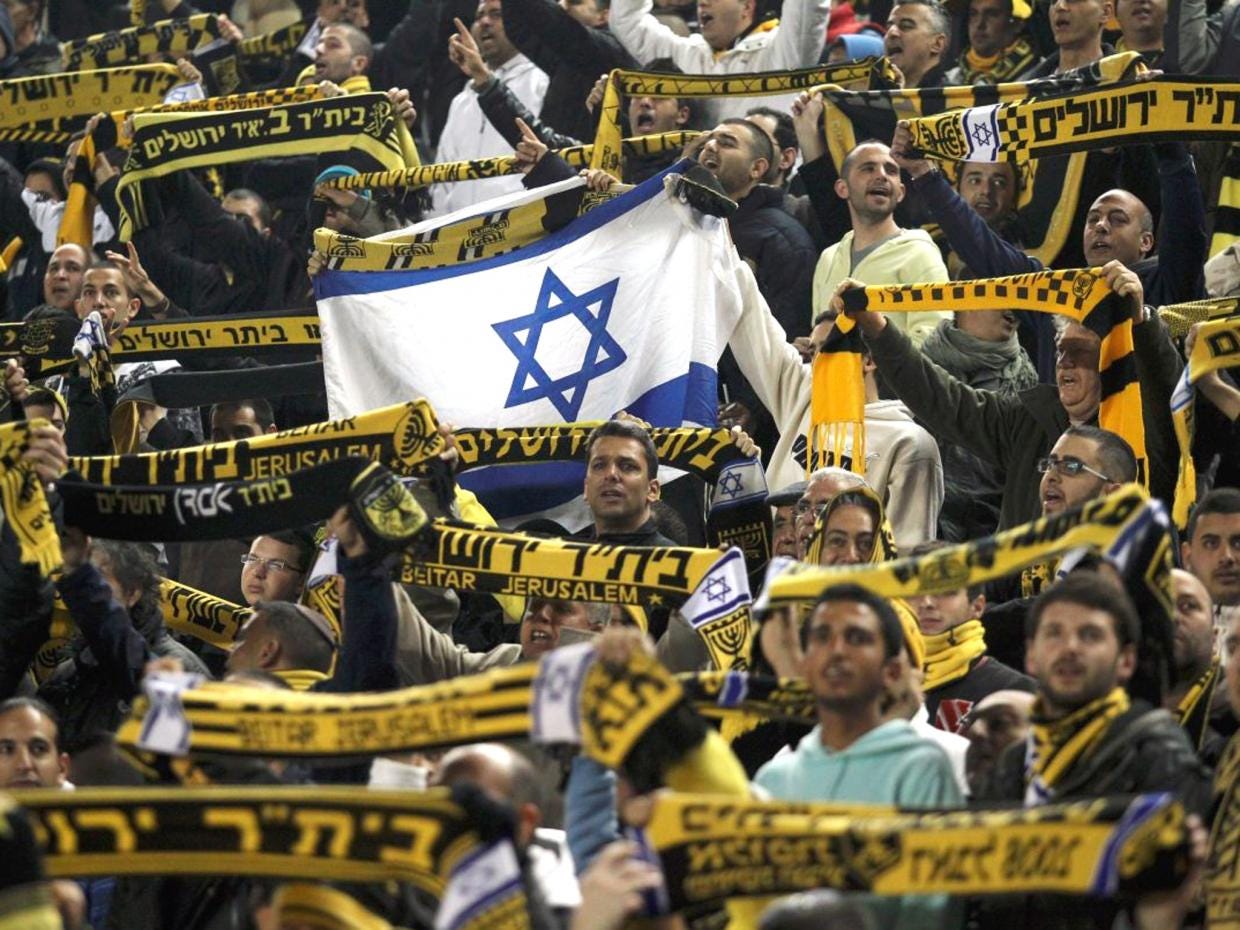
THIS IS THE LAND OF ISRAEL/THIS IS THE LAND OF THE JEWS/WE HATE YOU SALIM TOUAMA /WE HATE ALL THE ARABSYou are an intruder in your own land.
But is any of this in the film? Well, sort of.
Tel Aviv is a secular city, probably the most liberal and tolerant in Israel. To the religious, whether Jewish, Moslem or Christian, it is sin city. And yet, there are only three scenes in the film where Palestinians interact with Jewish Israelis. In one, Salma and Laila are trying on clothes in a dress shop. We see the woman attendant eyeing them suspiciously. They ask where the fitting room is. The attendant says nothing. She points. The two women look at each other and smile knowingly. One tells the attendant that they’re not going to bite her. The other calls her an obscene name in Arabic.
Later we see Salma working in a restaurant kitchen. The staff there are laughing and joking, talking in Arabic. The Jewish supervisor comes in and shouts at them not to speak in Arabic. The customers do not want their food spoilt by hearing Arabic, he says. Salma replies angrily, throws her overall at him and leaves.
In the third scene, outside the law courts, Laila and a male colleague are chatting. He makes an advance. She tells him to keep their relationship as an innocent flirtation. Then she mocks him by reminding him that his mother will have a Kosher bride lined up for him — which should remind us that intermarriage in Israel is impossible. There is no civil marriage.
There is another scene where Salma goes into a bar, looking for work, and the bartender asks her if she is from Brazil, South American. Why does he think she is a foreigner? She doesn’t tell him that she’s Israeli. She says: I’m Palestinian.
THEY
DISCOVER THAT NO MATTER HOW FAR THEY GO FROM THEIR TOWNS AND THE
TRADITIONS THEY COME FROM THEY ARE SHOCKED THAT THE PLACE WHERE THEY ARE
(TEL AVIV) DOESN’T ACCEPT THEM.
(Maysaloun Hamoud)
Most of the reviews ignore these scenes and the clues they offer as to how Palestinian Israelis & Jewish Israelis relate — or don’t relate — to one another. When Hamoud talks of ‘a kind of invisible life’ of Palestinian youth, she surely means not only invisible to their traditional Palestinian families but also invisible to the dominant culture.
NO-ONE SHOULD FEEL GOOD AFTER THE MOVIE, NEITHER ISRAELIS NOR PALESTINIANS IN THIS SOCIETY.
(Maysaloun Hamoud)
The scenes of smoking, drinking, drug taking, partying have been described in reviews as Palestinians having fun and in one review as ‘humanising’ Palestinians. To me the endless chain smoking has something neurotic about it and the party scenes look more like a desperate attempt to escape an impossible situation. And the final shot of the three women staring glumly at the camera tells you that escape is impossible. They can no longer subscribe to the conservative values of traditional Palestinian society. Nor can they belong to a society which sees them as a threat to the purity of the state. Where can they feel at home?
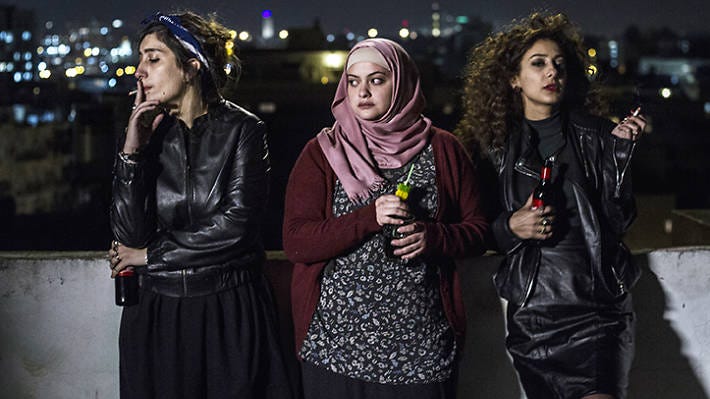
In between, indeed.

